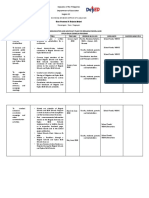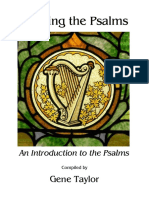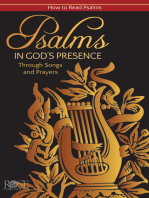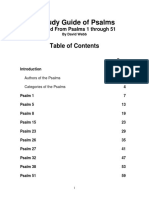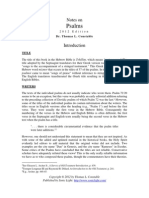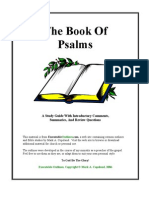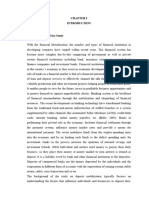0 ratings0% found this document useful (0 votes)
Erq124 01
Erq124 01
Uploaded by
tamboopongThe document provides an overview and introduction to the Book of Psalms. It discusses that:
1) The Book of Psalms is a collection of prayers and songs written by different poets in Old Testament times to express their relationship with God.
2) The poets wrote their poems for both personal devotion and public worship in the temple. Many of the psalms were set to music and accompanied by instruments.
3) The major poet who contributed to the Book of Psalms was King David, but it also includes works from other temple musicians like Asaph and the sons of Korah. The psalms express a wide range of human emotions and experiences.
Copyright:
© All Rights Reserved
Available Formats
Download as PDF, TXT or read online from Scribd
Download as pdf or txt
Erq124 01
Erq124 01
Uploaded by
tamboopong0 ratings0% found this document useful (0 votes)
The document provides an overview and introduction to the Book of Psalms. It discusses that:
1) The Book of Psalms is a collection of prayers and songs written by different poets in Old Testament times to express their relationship with God.
2) The poets wrote their poems for both personal devotion and public worship in the temple. Many of the psalms were set to music and accompanied by instruments.
3) The major poet who contributed to the Book of Psalms was King David, but it also includes works from other temple musicians like Asaph and the sons of Korah. The psalms express a wide range of human emotions and experiences.
Original Description:
SDA 1st quarter lesson study 2024
Original Title
ERQ124_01
Copyright
© © All Rights Reserved
Available Formats
PDF, TXT or read online from Scribd
Share this document
Did you find this document useful?
Is this content inappropriate?
The document provides an overview and introduction to the Book of Psalms. It discusses that:
1) The Book of Psalms is a collection of prayers and songs written by different poets in Old Testament times to express their relationship with God.
2) The poets wrote their poems for both personal devotion and public worship in the temple. Many of the psalms were set to music and accompanied by instruments.
3) The major poet who contributed to the Book of Psalms was King David, but it also includes works from other temple musicians like Asaph and the sons of Korah. The psalms express a wide range of human emotions and experiences.
Copyright:
© All Rights Reserved
Available Formats
Download as PDF, TXT or read online from Scribd
Download as pdf or txt
0 ratings0% found this document useful (0 votes)
Erq124 01
Erq124 01
Uploaded by
tamboopongThe document provides an overview and introduction to the Book of Psalms. It discusses that:
1) The Book of Psalms is a collection of prayers and songs written by different poets in Old Testament times to express their relationship with God.
2) The poets wrote their poems for both personal devotion and public worship in the temple. Many of the psalms were set to music and accompanied by instruments.
3) The major poet who contributed to the Book of Psalms was King David, but it also includes works from other temple musicians like Asaph and the sons of Korah. The psalms express a wide range of human emotions and experiences.
Copyright:
© All Rights Reserved
Available Formats
Download as PDF, TXT or read online from Scribd
Download as pdf or txt
You are on page 1/ 8
Easy Reading Edition
1 December 30–January 5
How to Read the Psalms
SABBATH—DECEMBER 30
READ FOR THIS WEEK’S LESSON: Nehemiah 12:8; Psalm
25:1–5; Psalm 3; 2 Samuel 23:1, 2; Psalm 16:8.
The poets who wrote MEMORY VERSE: “Jesus said to them, ‘Remember when
the Psalms wrote their I was with you before? I said that everything written about
prayers and songs to God. me must happen—everything written in the Law of Moses,
the books of [that were written by] the prophets, and the
Psalms’ ” (Luke 24:44, ERV).
THE BOOK OF PSALMS is a collection of prayers and songs
for Jews and Christians. The poets who wrote the Psalms
wrote their prayers and songs to God. The poets wrote in their
own words. But God gave the poets their ideas. So, the Book
of Psalms comes from God. God talks to His people in its
poems, the same as He does in the rest of the Bible (2 Peter
1:21). Jesus and the New Testament writers used quotes from
the Psalms in their teachings. They taught that these poems
were part of God’s Word, the Bible (Mark 12:10; John 10:34,
35; John 13:18). The Book of Psalms is part of God’s Word as
much as any other book of the Bible.
Different poets wrote the Book of Psalms during Old
Testament times. The poets wrote their poems in the
Hebrew language. The poems tell us about the times when
the poets lived. The Book of Psalms is for our time, too.
When we accept the Book of Psalms as God’s Word to us,
we can understand its messages. We must pay attention to
the history and teachings in the Book of Psalms. We must
study, too, how the Israelites used the songs for worship.
Then we will understand better what God wants to tell us
today.
4 HOW TO READ THE PSALMS
SUNDAY—DECEMBER 31 Lesson 1
SONGS FOR WORSHIP IN OLD TESTAMENT TIMES
(Nehemiah 12:8)
Why was the Book of Psalms written? When did God’s
people use the Psalms? Read 1 Chronicles 16:7; Nehemiah
12:8; Psalm 18:1; Psalm 30:1; Psalm 92:1; Psalm 95:2;
Psalm 105:2; Colossians 3:16; and James 5:13 for the
answers.
The Book of Psalms is a collection of poems. Different poets
wrote the Book of Psalms. Their poems are also songs and
prayers to God. The poets wrote their poems for both personal
and public worship. The Israelites sang the poems as hymns to
God in His temple. Many poets included short notes with their
poems or songs. The notes told the music leaders (Psalm 8:1)
which musical instruments they should play (Psalm 61:1) or the
tune they should use when they sang the song (Psalm 9:1).
In the Hebrew language, the title of the Book of Psalms is
“tehelim.” “Tehelim” means “praises.” “Tehelim” shows us an
important reason the Psalms were written: to praise God. Our
word “psalms” comes from the Septuagint. The Septuagint is a
copy of the Old Testament written in the Greek language. The
Septuagint was made 200 or 300 years before Jesus was born.
In the Septuagint, the word for “psalms” is written as “psalmoi”
in the Greek language. The poets of the Book
The Book of Psalms was an important part of Israel’s worship. of Psalms wrote their
God’s people used it for temple celebrations, religious feasts, poems for both personal
parades, and when the Ark of Promise came to Jerusalem. and public worship.
Psalms 120–134 were songs for going up to the temple. God’s
people sang these songs on their way to Jerusalem to cele-
brate three big religious festivals each year (Exodus 23:14–17).
The people sang Psalms 113–118 and Psalm 136 at the three
festivals. They sang these songs at the New Moon festivals and
when the leaders gave the temple to God. The people sang
Psalms 113 and 114 at the start of the Passover meal, and
Psalms 115–118 at the end (Matthew 26:30). The Passover was
the time when God brought Israel out of Egypt. Psalms 145–150
were part of the morning prayers used for worship in the temple.
The Psalms taught God’s people how to worship Him in His
temple. Jesus prayed with the words from Psalm 22 (Matthew
27:46). The New Testament churches also taught and sang from
the Book of Psalms, too (Colossians 3:16; Ephesians 5:19).
How can we use the Book of Psalms in both our private
and public worship today?
HOW TO READ THE PSALMS 5
Lesson 1 MONDAY—JANUARY 1
MEET THE POETS OF THE BOOK OF PSALMS
(Psalm 25:1–5)
King David wrote most of the poems in the Book of Psalms.
David is named “the sweet [the most pleasant] singer of
Israel” (2 Samuel 23:1, ERV). David had an important part in
selecting the songs for worship in the temple. New Testament
writers also say that David wrote many poems in the Book of
Psalms (Matthew 22:43–45; Acts 2:25–29, 34, 35; Acts 4:25;
Romans 4:6–8). Temple musicians wrote some of the poems
in the Book of Psalms, too. These temple musicians were also
Levites: Asaph wrote Psalm 50 and Psalms 73–83. The sons
of Korah wrote Psalm 42, Psalms 44–49; Psalm 84; Psalm
85; Psalm 87; and Psalm 88. Heman the Ezrahite also wrote
Psalm 88. Ethan the Ezrahite wrote Psalm 89. Then there were
the poems that Solomon and Moses wrote: Solomon wrote
Psalm 72 and Psalm 127. Moses wrote Psalm 90.
Read Psalm 25:1–5; Psalm 42:1; Psalm 75:1; Psalm 77:1;
Psalm 84:1, 2; Psalm 88:1–3; and Psalm 89:1. What do
these poems tell us about the poets who wrote them and
King David wrote their experiences?
most of the poems
in the Book of Psalms. The Holy Spirit gave these poets their ideas. God used their
talents to serve Him and His people. The poets were men with
powerful faith and deep love for God. At the same time, the
poets often felt the way we do. They felt hopeless. They fought
against Satan’s lies and traps. Yes, the poets wrote their songs
and poems a long time ago. But they talk about many of our
same experiences:
“Please hear my prayer. Pay attention to my cry for help.
I have so many troubles/ I’m about to die” (Psalm 88:2, 3,
NIrV).
Who doesn’t feel this way at times? For sure, someone
from our time could have written this cry for help.
Some poems in the Book of Psalms are about joy. Other
poems are about hard times. The poets are honest about their
suffering. They cry to God for help, and He saves them. The
poets praise God for His love. They promise to serve God for-
ever. The Book of Psalms is a message about God’s saving
love, mercy, and hope. The Book of Psalms is God’s promise
to forgive us and give us new life.
The poets who wrote the Book of Psalms suffered many
things we suffer. How does this thought give you hope?
6 HOW TO READ THE PSALMS
TUESDAY—JANUARY 2 Lesson 1
A SONG FOR EVERY PART OF OUR LIVES (Psalm 3)
Read Psalm 3; Psalm 33:1–3; and Psalm 109:6–15.
What human experiences do these songs talk about?
The Book of Psalms is filled with songs about human
experience. We see six types of songs: 1. Praise hymns give
glory to God because He is the King and keeps His promises.
2. Thanksgiving songs thank God for His many blessings.
3. Laments are songs about sorrow or sadness. Many
laments are cries to God to save His people from trouble.
4. Wisdom songs are filled with advice about how to live a
holy life. 5. Royal songs talk about God’s Chosen One, who
is Israel’s future King and Savior. 6. History songs talk about
Israel’s past. They show us how God kept His promises to
His people when they broke their promises to Him. History
songs teach the future children of Israel to remember the
past and not to make the same mistakes their fathers made.
These poems grab our attention. What writing skills did
the poets use to make their poems so powerful?
Word combinations: Poets combined words with the
same meaning: “My soul, praise the Lord! Every part of
me, praise his holy name!” (Psalm 103:1, ERV). Do you see
how the words “My soul” and “every part of me” are alike?
The poet combines these same words together in the same
verse to help us understand his idea better. Sometimes
poets combined different words to do the same thing. “I
cry out to you day and night” (Psalm 88:1, ICB). The words
“day” and “night” show us the poet cries to God all the time.
Word pictures: Word pictures help us see, touch, smell,
hear, or taste life. These pictures help us better understand
the poem’s message. In Psalm 17:8, the poet compares
God and the protection He gives us to a mother bird who The Book of Psalms
“hides her young under her wings” (ERV). is filled with songs
about human experience.
Double meanings: Sometimes the poets used words
(Read Psalm 23.)
that looked almost the same but had different meanings. In
Psalm 96:4, 5, the poet uses two Hebrew words that look
alike: “ ’elohim,” which means “gods,” and “ ’elilim,” which
means “false gods” or “statues.” The poet uses these words
to help us understand his message: The gods of the other
people groups near Israel may look as if they are “ ’elohim,”
or gods. But they are only “ ’elilim,” or statues.
Selah: Poets used the word “selah.” This word told the
reader to stop and think about the poem’s message. Or
“selah” alerted the musician to a change in the song.
HOW TO READ THE PSALMS 7
Lesson 1 WEDNESDAY—JANUARY 3
PRAYERS FROM GOD (2 Samuel 23:1, 2)
Read 2 Samuel 23:1, 2 and Romans 8:26, 27. What do
these verses teach us about prayer?
The prayers and praises in the Book of Psalms are writ-
ten to God. At the same time, these prayers and praises
come from God. God gave the poets their ideas.
The poets talk to God personally. In their poems, God is
“my God and King” (Psalm 5:2, ERV), and “Lord,” (Psalm
84:3, ERV). The poets often ask God to “listen to my words”
(Psalm 5:1, ICB), “hear my prayer!” (Psalm 39:12, ERV), “look
at my suffering and troubles” (Psalm 25:18, ICB), “answer me”
(Psalm 102:2, ERV), and “save me” (Psalm 6:4, ERV). These
words show us someone who is praying to God.
The Psalms are powerful and beautiful prayers. They
are so powerful and beautiful because they are also God’s
Word, the Bible. Paul tells us how prayer works: “Also the
Spirit helps us because we are weak. We do not know how
we should talk to God. But the Spirit himself talks to God
for us, while we cry and cannot say any words. God looks
Many of the poets write to see what is in people’s hearts. And he knows what the
about their own life Spirit is going to do. The Spirit talks to God for God’s peo-
experiences and the ple. And he asks for them what God wants them to have”
experiences of the (Romans 8:26, 27, WE). The prayers in the Book of Psalms
Jewish people. help us to have this same experience with God that Paul
(Read Psalm 137.) talks about.
Jesus used quotes from the Book of Psalms when He
taught and preached. In Luke 20:42, 43, Jesus uses this quote
from Psalm 110:1: “ ‘David himself says in the Book of Psalms,
“The Lord said to my lord, ‘Sit at my right hand [next to me]
until I put your enemies under your control’ ” ’ ” (NIrV).
As we saw yesterday, some poems in the Book of
Psalms are about Israel’s history. Many of the poets write
about their own life experiences and the experiences of
the Jewish people. As you read the Book of Psalms, you
will see that the poems talk about hope, praise, fear, anger,
and sadness. These things are feelings and experiences
that people everywhere, and in every age, know and under-
stand. The poems in the Book of Psalms are for every one
of us because they are about our own experiences.
How important is the Book of Psalms to our own faith
experience? How does Jesus’ use of the Psalms help us
answer that question?
8 HOW TO READ THE PSALMS
THURSDAY—JANUARY 4 Lesson 1
GOD AND HIS HOLY POETS (Psalm 16:8)
How did the poets of the Book of Psalms feel about
God? Read Psalm 16:8; Psalm 44:8; Psalm 46:1; Psalm
47:1, 7; Psalm 57:2; Psalm 62:8; Psalm 82:8; and Psalm
121:7 for the answer.
God is the most important part of the poets’ lives in the
Book of Psalms. The poets lived fully for God. Their poems,
praises, and life experiences were about doing what God
wanted. God made everything in the skies and on earth.
God is the King and Judge of the whole earth, too. God
gives His children everything they need. So, we can trust
God all the time. When God’s people suffer, their enemies
“are always saying, ‘Where is your God?’ ” (Psalm 42:10,
ICB). God’s people know the answer. God is always with
them. He can’t fail His people. So, His people can always
trust in Him. The Book of Psalms teaches us that all people
will worship God in the future (Psalm 47:1; Psalm 64:9).
The idea that God is the most important part of our lives
makes Him the most important part of worship, too. Worship
in Old Testament times was different from worship as many
people understand it today. Worship in Old Testament times
was the most important part of people’s lives. So, the poets
wrote about everything that happened, both good and bad,
in their songs of worship and praise. God hears the poets
wherever He may be. He answers them in His perfect time
(Psalm 3:4; Psalm 18:6; Psalm 20:6).
The poets who wrote the Book of Psalms understood that
God could be or do things that no human can be or do. God
can live in heaven, and at the same time, He can live with
His people on earth. God can be far away and near at the
same time. God can be everywhere and, at the same time, The poets wrote about
in His temple (Psalm 11:4). God can be hidden (Psalm everything that happened,
both good and bad, in
10:1) and, at the same time, with us forever (Psalm 41:12).
their songs of worship and
These things are not possible for humans. But these things praise. (Read Psalm 38.)
are possible for God (Psalm 24:7–10). The poets also
understood that God was good. God was with the poets in
every experience. This knowledge gave them hope while
they waited for God to save them.
Can we limit God to only some parts of our lives? How
does the Book of Psalms help us answer this question?
Are you trying to keep God away from some parts of
your life? If yes, what are those parts of your life?
HOW TO READ THE PSALMS 9
Lesson 1 FRIDAY—JANUARY 5
ADDITIONAL THOUGHT: Read Ellen G. White, “The Temple
and Its Dedication,” pages 35–50, in Prophets and Kings;
and “The Benefits of Music,” pages 291, 292, in Messages to
Young People.
The Book of Psalms includes 150 poems. These poems
can be grouped into five books: Book 1 (Psalms 1–41),
Book 2 (Psalms 42–72), Book 3 (Psalms 73–89), Book 4
(Psalm 90–106), and Book 5 (Psalms 107–150).
The Book of Psalms borrowed poems from other collec-
tions of Hebrew poems and songs: from the sons of Korah
(Psalms 42–49, Psalm 84, Psalm 85, Psalm 87, Psalm 88),
from Asaph (Psalms 73–83), the Songs for Going Up to the
Temple (Psalms 120–134), and the Praise Songs (Psalms
111–118; Psalms 146–150). Psalm 72:20 tells us about a
small collection of poems that King David wrote.
Most poems in the Book of Psalms were written in the
time of King David (1,000 b.c.). The collection of poems
and songs continued to grow after King David died. After
the new temple was built, many people believe that Ezra
ordered the servants of God to put the different collections
of Hebrew songs and poems together in one book.
God led these holy men in their work. God showed them
which poems to include in the Book of Psalms. We can see
both God’s wisdom and man’s skill in the making of the
Book of Psalms. This combination of God and man join-
ing together helps us understand better how Jesus, who
was God, became one of us. “Bible truth comes from God.
Men write God’s ideas in human language. So, the Bible is
an example of God and humans joining together. We see
this same thing in Jesus. Jesus was the Son of God and
the Son of Man. What the Bible says about Jesus we also
can say about the Bible. Both the Bible and Jesus ‘became
human flesh and lived among us’ [John 1:14, NLV].”—Ellen
After the new temple was G. White, The Great Controversy, page 8, adapted.
built, many people believe
that Ezra ordered DISCUSSION QUESTIONS:
the servants of God
to put the different
collections of Hebrew
1 Together, God and humans made the poems in the Book of
Psalms. How does this idea help us understand that God wants
songs and poems together
to be very close to His people?
in one book.
2 In class, talk about how the Book of Psalms helped you
during a time of suffering. What hope did the Book of Psalms give
you at that time?
10 HOW TO READ THE PSALMS
Story
FINDING JESUS IN A HOLY BOOK INSIDE
P aul went from house to house in a big city in Europe. He
carried both a Bible and the holy book from another religion.
Paul knocked on the door of a house. A man opened the door.
by Andrew McChesney
His breath smelled of cigarette smoke.
Paul said, “I want to give you a gift today.”
The man asked, “What gift?”
Paul answered, “I have this Bible.”
The man said, “I don’t want a Bible. I belong to a different
religion. You are a Christian.”
Paul nodded. “I have your religion’s holy book, too.”
The man was surprised and interested. He said, “OK. Read to
me from my holy book. Don’t read me anything from the Bible.”
Paul opened the man’s holy book and read about Jesus. The
man grew more surprised. He asked, “Is this the same Jesus
who is also in the Bible?”
During the next few weeks, the man studied four lessons
about Jesus from his holy book. His religion’s holy book didn’t
talk about Jesus’ death on the cross. But his holy book did say
that Jesus will come again. The man saw that both people from
his religion and Christians waited for Jesus to come back.
When Paul arrived for the fifth lesson, the man wasn’t home.
A year passed. Then the man showed up at Paul’s church.
The man said, “I want to come to your church. Can I?”
Now Paul was surprised.
The man added, “I want to follow Jesus.”
After that day, the man came to church every Sabbath. The The man prayed, “Jesus,
I want You to make me
man told Paul that his religion’s holy book left him feeling empty
free.”
inside. His holy book did not talk about a Savior for his sins.
Now the man wanted to get baptized.
Paul said, “Jesus says that the human body is the same as
God’s temple. Do you want to be made free from cigarettes?
Jesus says, ‘So if the Son [Jesus] makes you free, you are
really free’ [John 8:36, ERV]. You must choose Jesus or ciga-
rettes. You can throw away your cigarettes today if you choose.”
The man looked scared. He said, “It’s not possible!” But then
he reached into his pocket and threw his cigarette pack into the
trash. He prayed, “Jesus, I want You to make me free.”
Late that night, the man called Paul on the phone. He said, “I
feel awful. I can’t live without cigarettes. Help me!”
The two men prayed on the phone. God heard their prayer
and gave the man His strength to win the fight against ciga-
rettes. The man hasn’t smoked since that time, four years ago.
Today, the man is a leader in the Adventist Church.
Paul says, “This man loves people. He is waiting for Jesus to
come back.”
Provided by the General Conference Office of Adventist Mission, which uses Sabbath School 11
mission offerings to spread the gospel worldwide. Read new stories daily at AdventistMission.org.
You might also like
- Communication and Advocacy Plan For Brigada Eskwela and Oplan Balik Eskwela Program94% (34)Communication and Advocacy Plan For Brigada Eskwela and Oplan Balik Eskwela Program2 pages
- F5 EG-When Words Fail-Printable-18-2 220131 081134100% (1)F5 EG-When Words Fail-Printable-18-2 220131 081134120 pages
- Psalms, Hymns, and Spiritual So - WILLIAM D. BARRICKNo ratings yetPsalms, Hymns, and Spiritual So - WILLIAM D. BARRICK6 pages
- Introduction:-: Hope in Suffering and Joy in Liberation: Wisdom Literature100% (1)Introduction:-: Hope in Suffering and Joy in Liberation: Wisdom Literature7 pages
- PSALMS: Interpretive Principles: (Berkhof, Principles of Biblical Interpretation, P. 155,156.)No ratings yetPSALMS: Interpretive Principles: (Berkhof, Principles of Biblical Interpretation, P. 155,156.)2 pages
- LDS Old Testament Notes 16: Wisdom & Poetry Literature (Job, Psalms, Proverbs, Ecclesiastes, Song of Solomon)No ratings yetLDS Old Testament Notes 16: Wisdom & Poetry Literature (Job, Psalms, Proverbs, Ecclesiastes, Song of Solomon)13 pages
- Reading The Psalms With Jesus: John DelhousayeNo ratings yetReading The Psalms With Jesus: John Delhousaye50 pages
- 0e604095 Song For Every Season 1why We Love The Psalms v2No ratings yet0e604095 Song For Every Season 1why We Love The Psalms v28 pages
- The Power Of Psalm 92: The Joy Of Flourishing In His Presence: The Power Of Psalms Series, #2From EverandThe Power Of Psalm 92: The Joy Of Flourishing In His Presence: The Power Of Psalms Series, #2No ratings yet
- Bible Class for Adults and Youth: Beginner's Guide: Psalms: BIBLE CLASS FROM SCRATCH, #19From EverandBible Class for Adults and Youth: Beginner's Guide: Psalms: BIBLE CLASS FROM SCRATCH, #19No ratings yet
- Bible Class for Adults and Youth: Tears of the HeartFrom EverandBible Class for Adults and Youth: Tears of the HeartNo ratings yet
- What's A "Psalm"? Who Wrote Them? and All That StuffNo ratings yetWhat's A "Psalm"? Who Wrote Them? and All That Stuff10 pages
- Consumer Research Powerpoint - Advertising To Millinnials and Generation ZNo ratings yetConsumer Research Powerpoint - Advertising To Millinnials and Generation Z20 pages
- Guide To Writing An Effective AP US History Essay100% (1)Guide To Writing An Effective AP US History Essay2 pages
- Portfolio Management System: Software Requirements SpecificationNo ratings yetPortfolio Management System: Software Requirements Specification10 pages
- Unrestricted Use Stock Not Equal To Available StockNo ratings yetUnrestricted Use Stock Not Equal To Available Stock5 pages
- Road Map of FI/CO: Financial Accounting Enterprises StructureNo ratings yetRoad Map of FI/CO: Financial Accounting Enterprises Structure5 pages
- Skimbleshanks - The Railway Cat QuestionsNo ratings yetSkimbleshanks - The Railway Cat Questions2 pages
- Com - Res - 11045 - AnnexK6 COC Vice MayorNo ratings yetCom - Res - 11045 - AnnexK6 COC Vice Mayor2 pages
- Daniel Defoe - History of The Plague 1665No ratings yetDaniel Defoe - History of The Plague 1665402 pages
- 281022-Annexure III - SOP FOR ENGAGEMENT OF ROsNo ratings yet281022-Annexure III - SOP FOR ENGAGEMENT OF ROs6 pages
- Communication and Advocacy Plan For Brigada Eskwela and Oplan Balik Eskwela ProgramCommunication and Advocacy Plan For Brigada Eskwela and Oplan Balik Eskwela Program
- F5 EG-When Words Fail-Printable-18-2 220131 081134F5 EG-When Words Fail-Printable-18-2 220131 081134
- Romans Disarmed: Resisting Empire, Demanding JusticeFrom EverandRomans Disarmed: Resisting Empire, Demanding Justice
- Psalm Basics for Catholics: Seeing Salvation History in a New WayFrom EverandPsalm Basics for Catholics: Seeing Salvation History in a New Way
- Psalms, Hymns, and Spiritual So - WILLIAM D. BARRICKPsalms, Hymns, and Spiritual So - WILLIAM D. BARRICK
- Introduction:-: Hope in Suffering and Joy in Liberation: Wisdom LiteratureIntroduction:-: Hope in Suffering and Joy in Liberation: Wisdom Literature
- The Singing Garden: A Study of the Book of PsalmsFrom EverandThe Singing Garden: A Study of the Book of Psalms
- PSALMS: Interpretive Principles: (Berkhof, Principles of Biblical Interpretation, P. 155,156.)PSALMS: Interpretive Principles: (Berkhof, Principles of Biblical Interpretation, P. 155,156.)
- LDS Old Testament Notes 16: Wisdom & Poetry Literature (Job, Psalms, Proverbs, Ecclesiastes, Song of Solomon)LDS Old Testament Notes 16: Wisdom & Poetry Literature (Job, Psalms, Proverbs, Ecclesiastes, Song of Solomon)
- Journey: Lesson 20 - The Praise Of The PeopleFrom EverandJourney: Lesson 20 - The Praise Of The People
- 0e604095 Song For Every Season 1why We Love The Psalms v20e604095 Song For Every Season 1why We Love The Psalms v2
- Sonnets From the Psalms: Psalm I through LXXVFrom EverandSonnets From the Psalms: Psalm I through LXXV
- The Power Of Psalm 92: The Joy Of Flourishing In His Presence: The Power Of Psalms Series, #2From EverandThe Power Of Psalm 92: The Joy Of Flourishing In His Presence: The Power Of Psalms Series, #2
- The Psalms: Volume 4 - Savouring Choice SelectionsFrom EverandThe Psalms: Volume 4 - Savouring Choice Selections
- Bible Class for Adults and Youth: Beginner's Guide: Psalms: BIBLE CLASS FROM SCRATCH, #19From EverandBible Class for Adults and Youth: Beginner's Guide: Psalms: BIBLE CLASS FROM SCRATCH, #19
- Bible Class for Adults and Youth: Tears of the HeartFrom EverandBible Class for Adults and Youth: Tears of the Heart
- Exploring The Psalms: Volume 1 - Thoughts on Key ThemesFrom EverandExploring The Psalms: Volume 1 - Thoughts on Key Themes
- What's A "Psalm"? Who Wrote Them? and All That StuffWhat's A "Psalm"? Who Wrote Them? and All That Stuff
- Heaven's Hymnbook: An Overview of the Psalms Vol. 1From EverandHeaven's Hymnbook: An Overview of the Psalms Vol. 1
- Romans (Word and Spirit Commentary on the New Testament)From EverandRomans (Word and Spirit Commentary on the New Testament)
- Consumer Research Powerpoint - Advertising To Millinnials and Generation ZConsumer Research Powerpoint - Advertising To Millinnials and Generation Z
- Portfolio Management System: Software Requirements SpecificationPortfolio Management System: Software Requirements Specification
- Unrestricted Use Stock Not Equal To Available StockUnrestricted Use Stock Not Equal To Available Stock
- Road Map of FI/CO: Financial Accounting Enterprises StructureRoad Map of FI/CO: Financial Accounting Enterprises Structure
